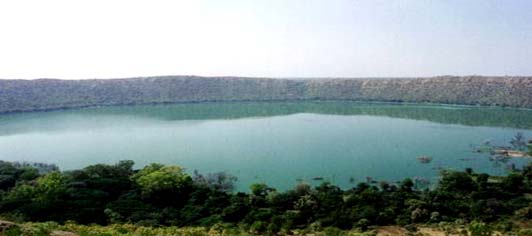
|
 |
AGCA-Meteor Study Circle
Lonar Crater in India is only largest meteoric crater in basalt offering a wide variety of study. The formation of planetary impact structures involves the interplay of multiphase processes occurring over size and time scales that range over many orders of magnitude. A comprehensive understanding of the impact process requires coupling planetary, geologic and geophysical observations with experimental and theoretical studies. Studying the impact process requires input from teachers, students, scientists representing a wide variety of disciplines, including teachers, astronomers, physicists, field geologists, exploration geophysicists, geochemists, and photo geologists. Our lack of knowledge about key aspects of the impact process translates directly into limitations in our ability to answer key scientific questions throughout the spectrum of research activities in space science. For example, details of impact basin formation are critical for understanding related environmental effects and their influence on life and uncertainties in the relationship of crater size to impactor energy limits our ability to date planetary surfaces. Significant work has been done recently in several key areas of impact studies, but in many respects there appears to be a “disconnect” among groups employing different approaches. The time is ripe for a major initiative to bring together the various approaches to studying the impact process, summarize the new findings, and address outstanding questions. Our recommended approach is to have multi-disciplinary research teams devoted to various aspects of the impact cratering process. The teams would guide a series of topical workshops and then summarize the results in a final comprehensive, coherent report. Our suggested research focus areas follow. In some cases we list illustrative subtopics. 1. Initial energy partitioning and shock wave propagation.
2. Target properties.
3. Ejecta emplacement.
4. Complex crater formation.
5. Influence of gravity on impact cratering: from asteroids to planets. 6. Dating planetary surfaces with craters.
7. Longterm post impact effects.
8. The primary components of this initiative are:
This initiative idea has been discussed extensively within the community of impact researchers and already has wide support within that group. Because the study of impact craters directly influences studies in many other fields of planetary science, we also anticipate strong participation from many researchers who are not considered cratering specialists. The Impact Field Studies Group is dedicated to:
Membership is open to students, teachers, serious interested individuals in this subject and researchers interested in or who are actively conducting field-based research. It was decided that we would start out small and bring on new members every year as interest grows. By joining AGCA, you agree to attempt to meet once a year at a group-sponsored event to present your own research and share your experiences with other workers. For more information on becoming a member, please contact Bharat Adur at: akashgangaobservatory@gmail.com. |
| contact us | feedback | |
